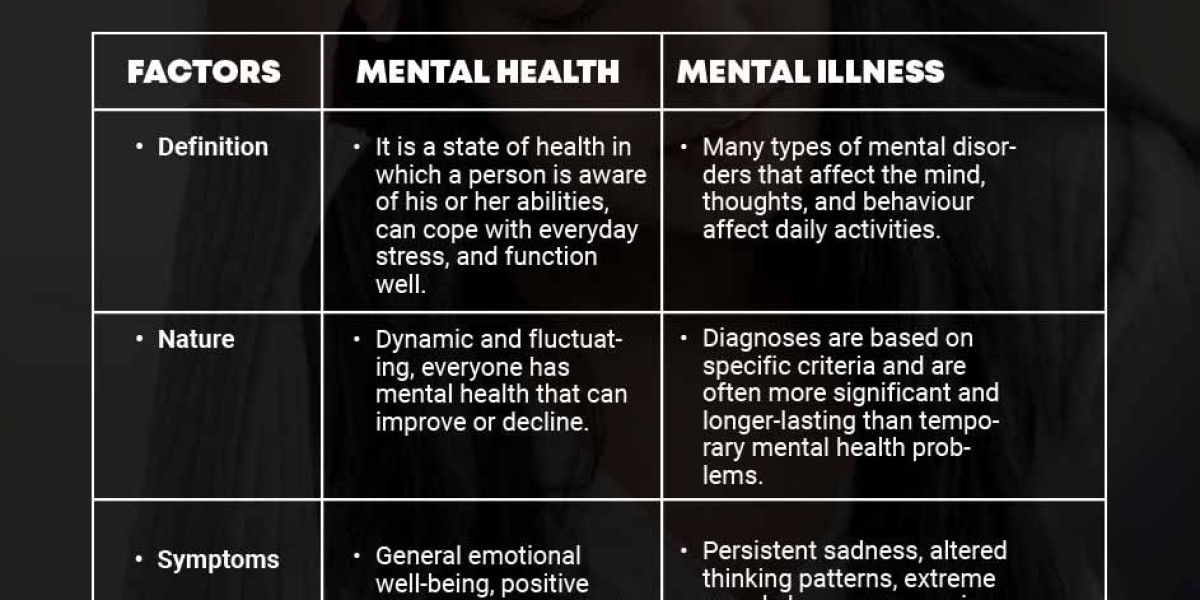Recognizing this difference is crucial in fostering a supportive environment for mental health care and ensuring that mental illnesses receive appropriate treatment. In this blog, we'll explore the key differences between mental health and mental illness. You'll learn about the spectrum of mental well-being, how to identify healthy mental states, and when professional support may be needed. Keep reading!
What is the Difference Between Mental Health and Mental Illness?
Both mental health and mental illness affect brain function and concentration. However, it's important to distinguish between the two. Here's a breakdown of their key differences:
1. Definition
- Mental Health: A state where a person is aware of their abilities, manages stress, and functions well.
- Mental Illness: Disorders affecting thoughts, emotions, and behavior, disrupting daily life.
2. Nature
- Mental Health: Dynamic and ever-changing; it can improve or decline.
- Mental Illness: Diagnosed based on specific criteria and typically longer-lasting.
3. Symptoms
- Mental Health: Balanced mood, positive self-esteem, effective coping strategies.
- Mental Illness: Persistent sadness, extreme mood swings, altered thinking, withdrawal from activities.
4. Influencing Factors
- Mental Health: Life experiences, social relationships, physical health, lifestyle choices, genetics.
- Mental Illness: A combination of genetic, environmental, biological, and psychological factors.
5. Treatment and Care
- Mental Health: Maintained through self-care practices like healthy eating, regular physical activity, stress management, and good sleep habits.
- Mental Illness: Requires professional diagnosis, medication, psychotherapy, and lifestyle adjustments.
6. Impact on Life
- Mental Health: Supports daily functioning, stress management, and relationships.
- Mental Illness: Can severely impact daily activities, relationships, and quality of life.
7. Stigma and Perception
- Mental Health: Often overlooked but increasingly recognized as important for overall health.
- Mental Illness: Historically stigmatized but gaining more awareness and acceptance.
8. Approach
- Mental Health: Focuses on proactive, preventive measures to maintain well-being.
- Mental Illness: Involves reactive measures like clinical intervention and ongoing management.
9. Examples
- Mental Health: Emotional resilience, stress management, social well-being.
- Mental Illness: Depression, anxiety disorders, bipolar disorder, schizophrenia.
Expert's Advice
Now that you understand the differences between mental health and mental illness, it's essential to focus on improving both. Experts recommend lifestyle changes such as improving your diet, adjusting sleep patterns, and incorporating physical exercise into your routine. Including mental health exercises like meditation can also enhance your overall well-being.
The Final Say
Understanding the difference between mental health and mental illness helps you better manage your mental well-being. While good mental health can be maintained through various practices, mental illnesses often require intervention and treatment. Recognizing this distinction allows you to adopt a more informed approach to mental health care, helping to prevent or manage mental conditions more effectively.
FAQs
1. What is the concept of mental health and illness?
Mental health refers to emotional, physical, or mental well-being, while mental illness includes conditions that result from factors like trauma, loneliness, or abuse.
2. Is mental illness reversible?
Though mental illness can't be cured, it can be managed through activities such as yoga, meditation, and deep breathing.
About ToneOp
ToneOp is a platform that provides comprehensive health plans aimed at improving overall well-being. Whether you're looking for weight management, medical condition support, or face yoga plans, ToneOp offers personalized solutions with professional coach support.
Visit our website:
https://toneop.com/blog/differences-between-mental-health-and-mental-illness










